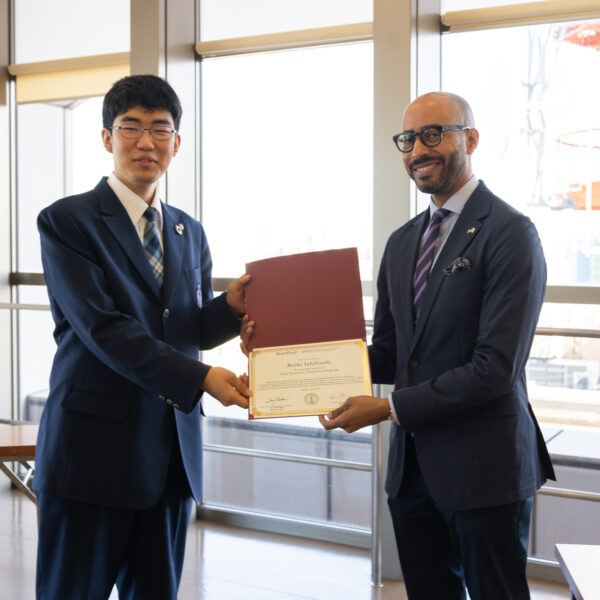
Jan 18, 2023
11th grader Reiki Ishibashi completed the Stanford e-Fukuoka program.
“What is Stanford e-Fukuoka like?”
The Stanford e-Fukuoka Program is the Fukuoka version of the cross-cultural understanding and education program, “Stanford e-Japan”, administered by the Stanford Program on International and Cross-Cultural Education (SPICE). The Stanford e-Fukuoka Program is organized by Fukuoka prefecture with the support of the US Consulate in Fukuoka. It is conducted online.
Applicants must be in grades 10 or 11 at the time of application, and they need to submit their application documents through their school, making sure to attach a personal statement, IELTS score report, etc.
I participated in this program for 5 months beginning in March of 2022 as one of the 30 members of the first cohort of Fukuoka high schoolers. We participated in lectures and discussions on themes such as “How Fukuoka Could Become an International Finance Hub”, “My SDGs Involvement”, “Entrepreneurial Spirit” and “Japanese American History” lead by Stanford professors and guest speakers. At the program’s end, we presented our independent research on the various themes.
“What made you want to participate in this program?”
I had planned on participating in “Stanford e-Japan” as an extracurricular activity during high school. When the “Stanford e-Fukuoka” application requirements flyer was passed out in school, I decided to specifically apply to this program within “Stanford e-Japan”.
“What was the most memorable aspect of this program for you?”
I was impressed by the current US diplomat’s seminar about soft power. Soft power stems not from financial or military might, but from the ability to gain influence in international society through garnering the support and understanding of others. Not only was this a new idea for me, but it also sparked my realization that, given the spread of internet usage, soft power can only become more powerful in the future.
“How have you changed or grown as a result of your participation?”
Through conversing with experts in international politics and world history, I gained a greater awareness of the pros and cons of Japanese and overseas societies and perspectives. Through discussions with the lecturers and other students, I learned to see things from diverse viewpoints and examine my own thoughts and words. We all have a tendency to pay closer attention to evidence that support our pre-existing viewpoints and ignore evidence to the contrary. Discussion with others allows us not only to be exposed to differing ways of thinking, but also to be challenged to re-think our perspectives. This, I believe, can lead to new knowledge. Social problems oftentimes have a myriad of intertwined causes, and I am convinced that discussions between people of diverse backgrounds can lead to stronger solutions.
“Building upon this experience, what challenges would you like to take on in the future?”
My aim is to help create a better world through science and technology. I have a particular interest in environmental issues, and I would like to contribute to this field.
In order to effectively address cross-national issues such as those relating to the environment, technological advancement must be accompanied by international agreements on both the political and financial fronts. The developments in clean energy technologies are not keeping pace with the increase in demand for energy in the world. This entails that we need to speed up the rate of technological advancement at the same time as we re-think our environmental policies and procedures.
Throughout the above processes, we must also consider how we can defray conflict between people with diverse perspectives and values in order to build consensus. For this, cross-cultural communication and understanding are key.
How can we solve environmental problems hand-in-hand with our global partners? I aim to become a researcher capable of dialogue and collaboration with both domestic and international stakeholders so we can employ science and technology to build a better future together.
“Please tell us about your visit with Stanford e-Fukuoka.”
The closing ceremony for first cohort to complete the Stanford e-Fukuoka program was held at the Fukuoka prefectural office. There, I received my completion certificate from Chuka Asike, the Principal Officer to the US Consulate Fukuoka. After this, I visited Governor of Fukuoka, Seitaro Hattori, and reported the program’s completion.
Within the frank and open conversational environment, I was able to offer my honest thoughts about the program, as well as my opinions about how the program could be improved. The Governor and Chief Consul’s words of encouragement meant a great deal to me. I am grateful for the valuable opportunity I was given.

Loading